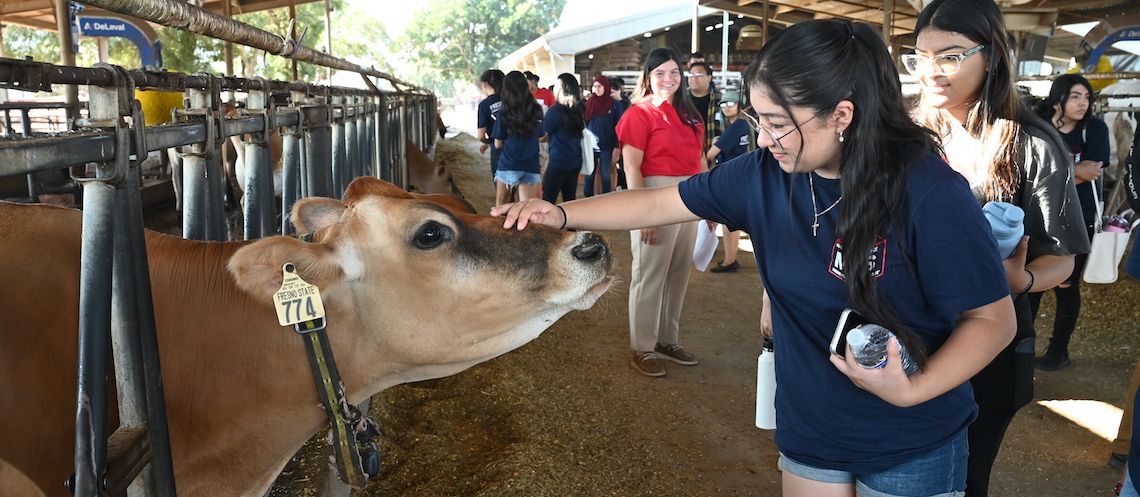
A high school student goes face-to-face with a dairy cow during a Multicultural Scholars Program farm tour at California State University, Fresno, as outreach leader Amy Suarez (in red) looks on. Photo via Fresno State
Written by Farm Credit Alliance
After some 40 years, the Farm Credit Multicultural Scholars Program at California State University, Fresno, is continuing to grow and expand its mission. In fact, the program is now reaching even more students and urging them to consider earning a college degree and pursuing a career in agriculture.
During the recently concluded school year, Fresno State completed the first year of an ambitious outreach program to visit Central Valley high schools to educate traditionally underrepresented students about the benefits of attending the university and pursuing a career in an agriculture-related field.
“We made 33 presentations and 14 farm tours during the school year,” said Amy Suarez, a graduate student leading the outreach effort. “The 60 ambassadors gave presentations about Fresno State as well as our ag programs. And they answered questions from the students about campus life, what it’s like to live in the dorms and about our majors. It was also important to show that all students can be accepted at Fresno State and that we thrive on diversity.”
The expanded high school program adds to a long list of nearly 80 outreach efforts held each year by the Jordan College of Agricultural Science and Technology. These include career fairs, community college presentations and workshops at the FFA Leadership Conference. During the year, the ambassadors reached 10,675 high school and community college students in the Central Valley and Central Coast. That’s up from around 6,000 in 2022-23 and just 620 in 2021-22, said Dr. Sharon Freeman, the program coordinator.
“For example, we had three of our ambassadors spend all day at a high school in Salinas, where they presented to eight groups of students in the ag teacher’s classrooms,” Freeman said. “We’ve found that students are receptive to learn about our six departments and the teachers are very appreciative as well.”
The student ambassador program has been strongly supported by Farm Credit since 2013, said Keith Hesterberg, president and CEO with Fresno Madera Farm Credit.
“During the past 11 years, Farm Credit has contributed over $765,000 to fund stipends each year for five ambassadors who serve as leaders of the program,” Hesterberg said. “Diversity has been part of Central Valley agriculture from the beginning as people from around the world migrated here to become farmers. That diversity is more important now than ever as we work to ensure that California agriculture reflects California’s rich diversity.”
Kevin Ralph, California State President for AgWest Farm Credit, said he was extremely pleased to see the expanded outreach to high school students.
“Our sponsorship has allowed the major expansion of the program to high school students while the program continues its outreach efforts to older students as well,” Ralph said. “It’s also a plus that this year the sponsorship is helping to reimburse the scholars for some of their travel expenses. Since the presentations take place from Modesto to Tulare, those stipends can really help these college students.”
Farm Credit organizations supporting the program are AgWest Farm Credit, American AgCredit, CoBank and Fresno Madera Farm Credit. These organizations are part of the nationwide Farm Credit System — the largest provider of credit to U.S. agriculture.
Freeman meets weekly with the ambassador leaders to go through the list of what’s coming up next and making sure enough people are in place for all of them, and Suarez keeps in touch throughout the week as well to orchestrate all the moving parts. Ambassadors can sign up for any activity that fits their schedules and student participation has been amazing.
“I couldn’t be more proud of the effort and energy going into this outreach effort,” she said.
Besides promoting careers in agriculture, the ambassadors also get much out of the program, Freeman said. They improve their communication, teamwork and time management skills, which improves their prospects for future employability.
Suarez is a good example of that.
“Being a part of the ambassadors has really helped me grow professionally,” Suarez said. “Managing the program has helped build my time management and management skills and I can see how it will help me pursue a career in the future. And just being able to develop relationships with other ambassadors has been a tremendous opportunity.”
Suarez has an ag background and participated in 4H and FFA growing up. In high school, she raised and sold Boer goats to students to show at county fairs. She joined the ambassador program as a sophomore and became one of the agricultural scholars after entering grad school. She expects to begin student teaching this fall and to become a full-fledged ag teacher by May 2025. She looks forward to continuing her outreach to students.
“It’s very important to have ag teachers,” Suarez said. “They can spark students’ passion to be part of the industry, help them become more aware of what is going on in ag and how food ends up on their tables.”








